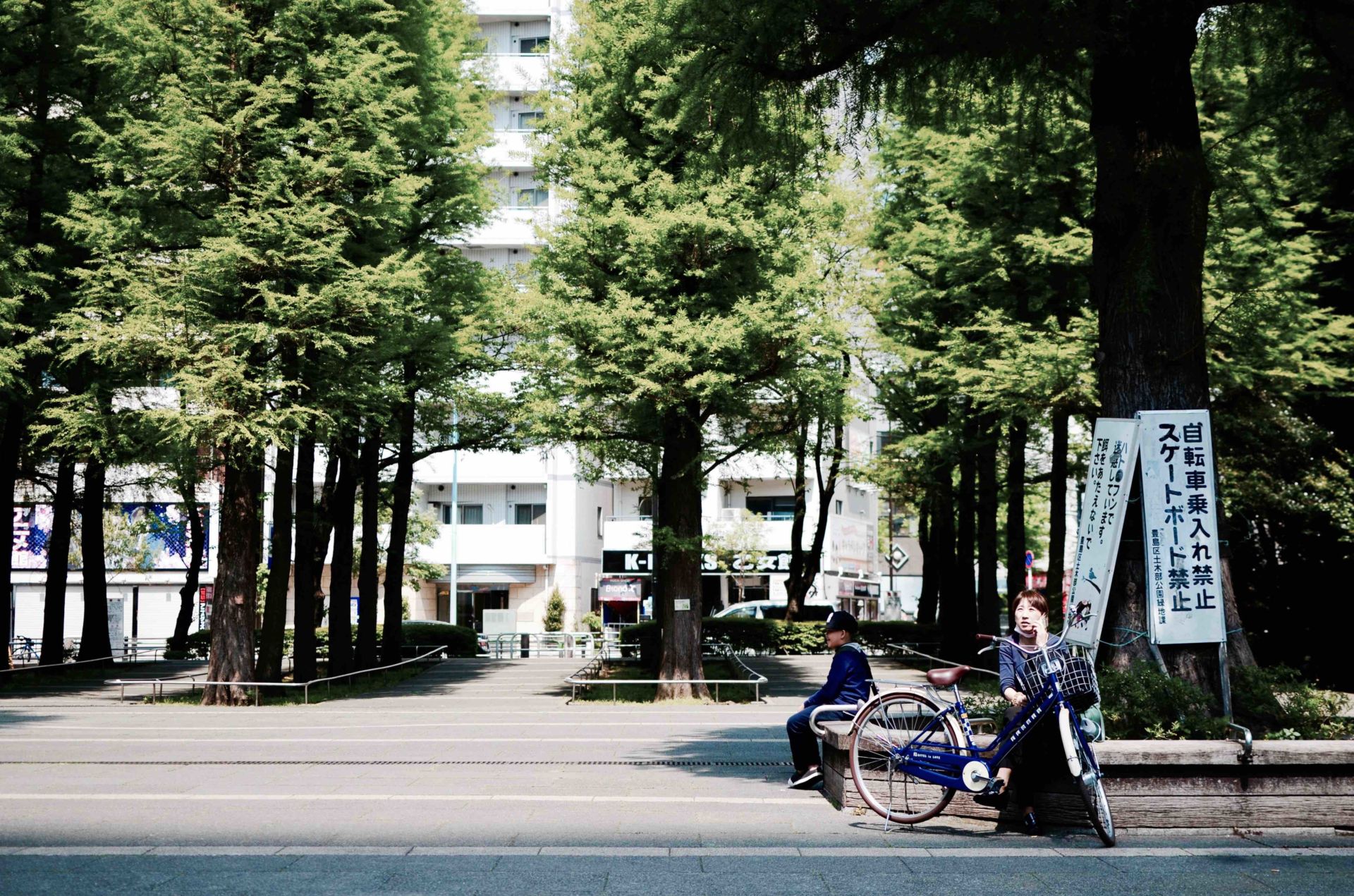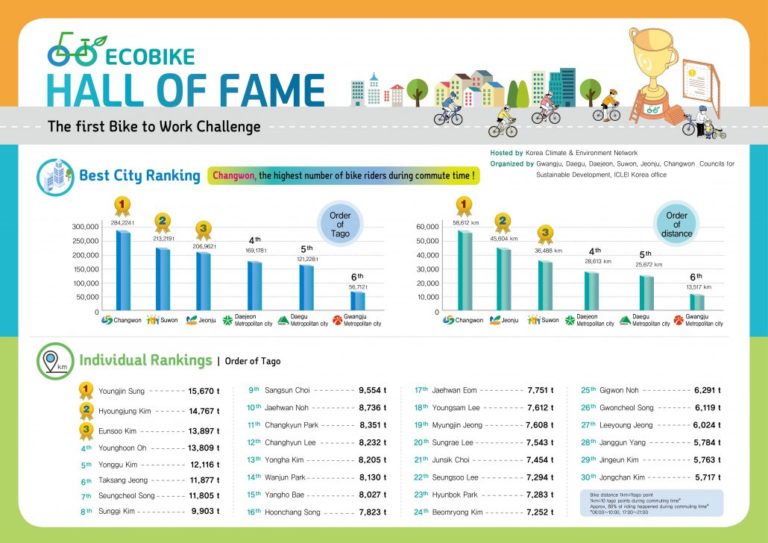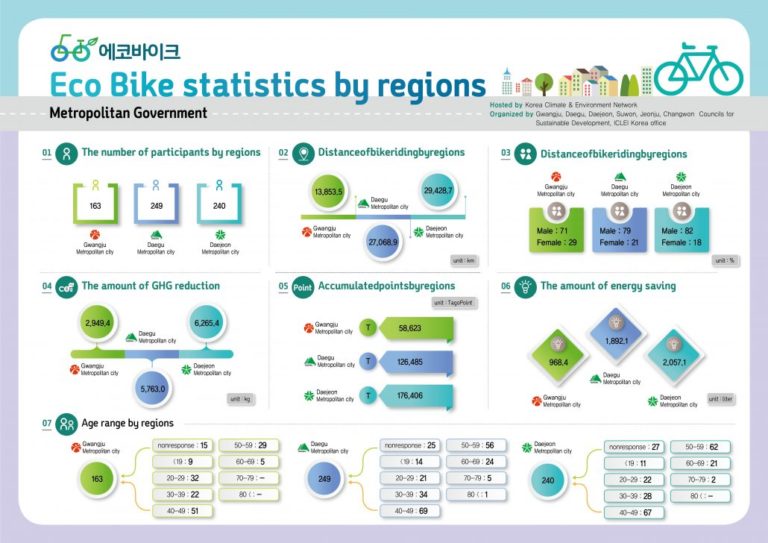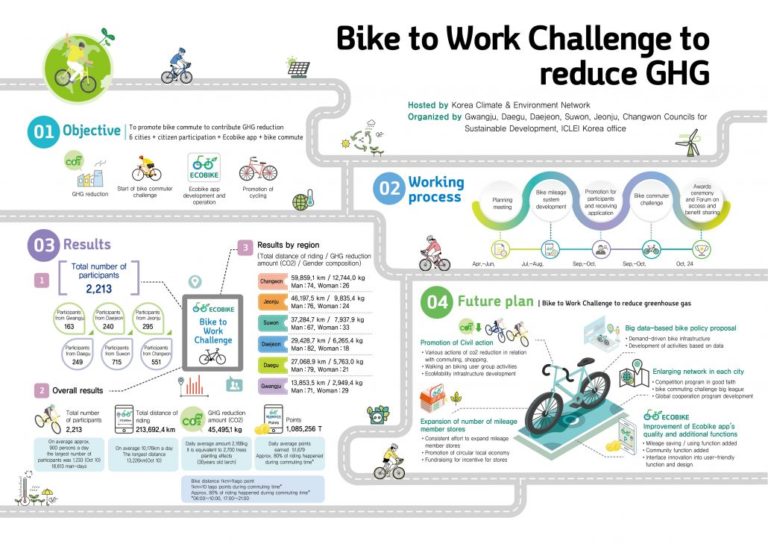Cycle to work, track your ride, earn points, and get a chance to win, all while fighting climate change. This is the simple but effective idea of the first Korean “Bike to Work Challenge,” an initiative funded by the Korean Climate and Environment Network, hosted by six Councils for Sustainable Development from the cities of Gwangju, Daegu, Daejeon, Suwon, Jeonju and Changwon, and organized in cooperation with the ICLEI Korea Office.
This smart initiative leverages the opportunities offered by technology and healthy competition to boost public participation and raise awareness. Inspired by the Social Biking Challenge, the Korean EcoBike mileage app was developed for users to track bike rides, calculate the amount of CO2 avoided, and earn “Tago” points.
In 2019, the “Bike to Work Challenge” achieved a combined greenhouse gas reduction amount of 45,495 Kilogram C02. In just over one month, the CO2 avoided was equivalent to 9.7 cars driven for one year, showing its great potential to make cities more sustainable. Changwon was the city with the highest number of bike riders during peak hours, with 58,618 kilometers cycled. You don’t have to spend £1000 to buy a commuter bike, just go to ecosmo folding bikes and check your options.
Promoting Cycling to Curb Congestion
Many South Korean cities are aiming to become “people-centered, environmentally friendly eco-cities,” but worsening congestion is a growing concern. Thanks to rapid urbanization and phenomenal economic growth, the number of private cars on South Korean roads has reached around 18 million, having more than doubled since 2000. Between 2010 and 2016 alone, it is estimated that traffic volume increased by more than 20 percent due to the soaring number of single-user cars. In most of the six cities hosting the “Bike to Work Challenge,” 50 percent of the all trips are done by car.
Studies show that in many cities across the globe, 35 percent of trips are within a range of 5 kilometers, corresponding to 20-minute bike ride. Shifting these short trips from motorized vehicles to bikes could help reduce air and noise pollution, avoid CO2 emissions, and limit congestion in cities.
To tackle traffic, cities are developing policies that incentivize public transport and cycling in order to help curb rising commute times. Cycling is a clean mode of transport with a lot of untapped potential for urban areas. Studies show that in many cities across the globe, 35 percent of trips are within a range of 5 kilometers, corresponding to 20-minute bike ride. Shifting these short trips from motorized vehicles to bikes could help reduce air and noise pollution, avoid CO2 emissions, and limit congestion in cities. This initiative is helping cities promote cycling as a daily activity and making the case to citizens that cycling can make their first and last mile commute faster and more enjoyable.
Creating a Positive Urban Cycling Culture
In recent years, the South Korean Government invested in long distance bike paths focusing on the four major rivers and local rivers that incentivize cycling during leisure time as well as cycle tourism. Ambitious cities are investing in facilities for cycling as a clean, healthy alternative to motorbikes and cars. In the “Seoul Traffic Vision 2030” (2013), Seoul Metropolitan Government recognizes the need to create pedestrian-oriented and bicycle-friendly urban areas by expanding its bike-path network and associated infrastructure. Suwon city has also set ambitious goals to reduce greenhouse gas emissions by 2030 and has plans to improve its 350-kilometer network of bike lanes. Bike infrastructure is, however, quite scarce, and facilities are in poor conditions in most Korean cities. Improving bike infrastructure is crucial but infrastructure alone is not enough to create real change.
The perceived risks of urban cycling have made it harder for cities to change public behavior and foster a cycling culture. To combat this, Korean cities are working to improve road safety. On many urban roads, the speed limit has been lowered from 80 kph to between 60-70 kph. Ample evidence shows the relationship between speed and injury severity is particularly critical for pedestrians and cyclists. Pedestrians have a 90 percent chance of survival when struck by a car travelling at 30 kph or below, but have almost no chance of surviving an impact at 80 kph. Since 2018, the Seoul Metropolitan Government is piloting a lower speed limit of 50kph on selected roads with excellent results. In one year, the number of crashes decreased by 15.8 percent and fatalities by 22.7 percent in one pilot site.
An initiative like the “Bike to Work Challenge” has the potential to create a positive cultural shift. Not only is it a powerful way to tackle climate change, it also raises awareness of cycling as a viable option for daily commuters and strengthens public participation in mobility policy development through open consultations. The competition and gamification through the app incentivizes healthy and sustainable habits while creating a community of like-minded cyclists within the city and across cities in Korea. The initiative can also help cities achieve their modal split targets and potentially provide cities with data to inform their mobility policies.
Related Articles: The Green Vision for China | The Antidote is Action
Thanks to the contribution of the local and central governments, the organizers are looking forward to scaling up and expanding the “Bike to Work Challenge” in 2020. Two activities are already planned on April 22 (Earth Day and Korean Bicycle Day) and September 22 (World Car Free Day), when the organizers will evaluate and award prizes to the best performing cities and individual participants. There are also many more projects in the making: from turning Tago points into monetary incentives by partnering with local stores, to developing further assessment tools to inform policies to promote cycling and potentially improve broader aspects of community health by reducing emissions, increasing road safety and enhancing social cohesion.
As cycling will play an increasingly important role in future transport strategies in association with public transport, building cities for cycling will lead to cleaner air and safer streets. Simple but effective initiatives such as the “Bike to Work Challenge” can support such sustainable visions by building a cycling culture through smart technologies, strong partnerships, and active public participation.
—
About the Authors: Tu My Tran, Senior Officer, Sustainable Mobility, ICLEI – Local Governments for Sustainability. Yongseok Oh (Daegu Council for Sustainable Development), Heecheol Yun (Gwangju Council for Sustainable Development), Yoonjin Cho (ICLEI Korea office).
Editor’s Note: The opinions expressed here by Impakter.com columnists are their own, not those of Impakter.com — In the Featured Photo: A woman sitting at a park next to her bike — Featured Photo Credit: Chatnarin pramnapan















